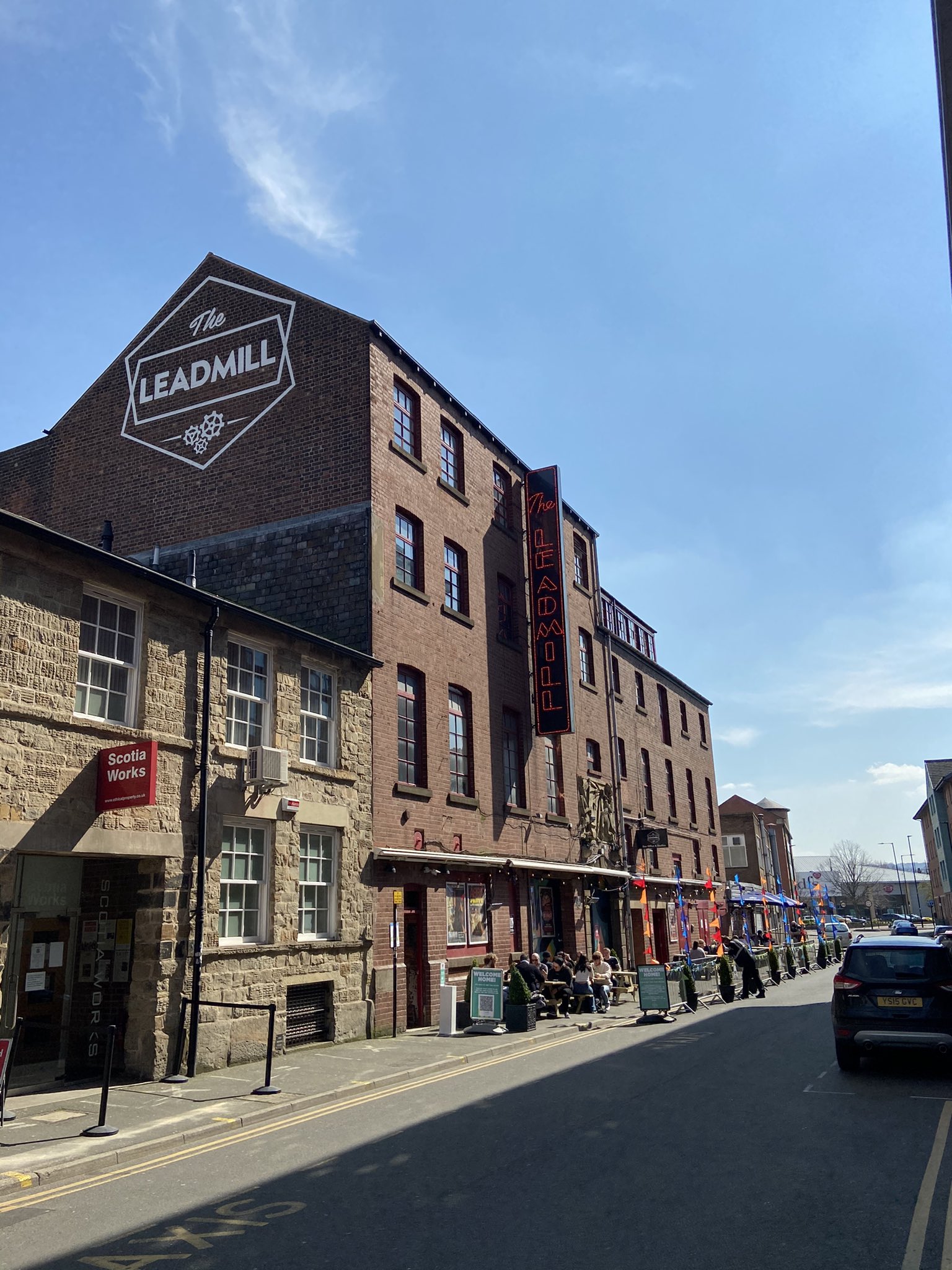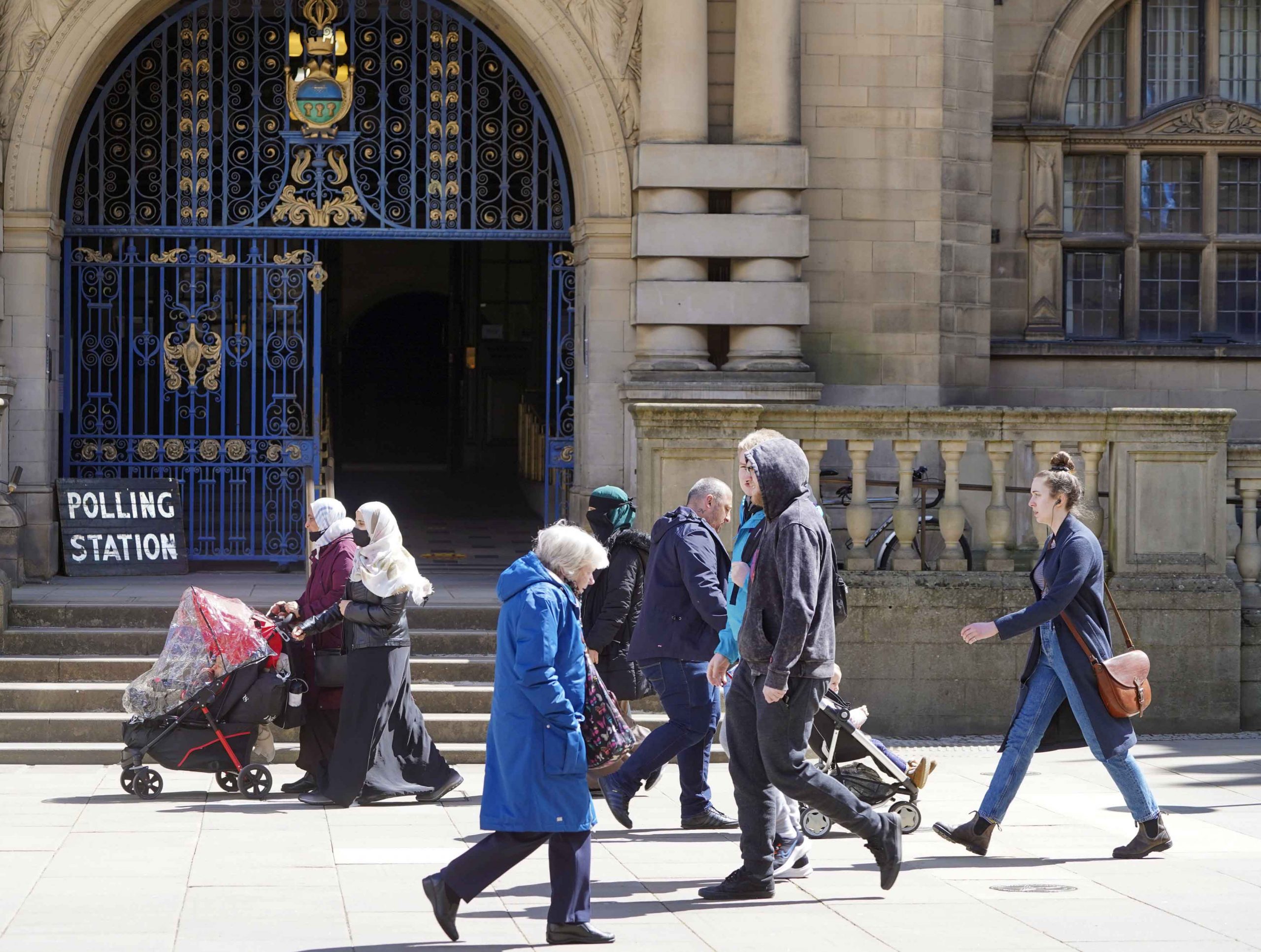
Sheffield’s beloved nightclub is back on its feet after 14 months
The Leadmill, Sheffield's oldest and most-beloved nightclub and live music venue, reopened its doors - sort of. They are open again for the first time since their short, 5-week seated experience whilst Sheffield was under tier-two lockdown back in September last year. Liam, a promoter for the venue, admitted that the last fourteen months have been "a really rough time, the start of the lockdown was devastating for us and the local community." Community is at the centre of The Leadmill's ethos. When the general manager was made aware that local retailers were hiking prices of products such as selling toilet roll, they used their wholesale contacts to order large supplies and sold them to the local people at cost price. Liam said of the move, "We saw so many people in need and shop owners were trying to capitalise on the fears of people to make some extra money. We knew we had an opportunity to give back to the community that has shown us so much love over the last forty years." That commitment to helping the community was immediately repaid when a Crowd Funder, set up as part of the Music Venue Trust's #SaveOurVenues Crowd Funder, raised £24,480. The campaign was set up to help prevent the closure of hundreds of independent music venues across the country. Acts which have previously performed at The Leadmill also chipped in to help save the historic venue. Alex Turner, lead singer of Sheffield's Arctic Monkeys donated a guitar to the Music Venue Trust which fetched £128,544 at auction, of which £7,200 went The Leadmill to pay for staff wages, rent and operating costs. Billy Bragg hosted a live streamed gig to raise further funds for the venue - amassing over £10,000 in donations during the day. Liam and the rest of The Leadmill's staff were ecstatic by the support shown. "The generosity of our customers has been mind-blowing. We care about our customers and it means everything to us - we'll make it worth it for you all." After over a year without any consistent income The Leadmill was forced to get creative and turn the pavement in front of the venue into a beer garden for its grand opening on the 12th, in line with the government's latest Covid-19 restrictions. The area, which for over four decades has been the site of dozens of smoking, lovesick indie music fans, has been transformed into a vibrant, intimate and socially-distanced beer garden - much to the joy of its long-adoring fans. Ben Armitage, a former Sheffield Hallam student, said: "We've all missed coming here, it's the best place in Sheffield for nights out if you love independent music and it's great to see that they've managed to stay on their feet." While the plan for The Leadmill is to focus on the indoor opening on May 17th and the grand re-opening on June 21st, Liam assured us "anything is possible at the moment, the beer garden has been an enormous success and we may bring it back for special occasions. "We're always pushing to be bigger and better, we missed out on our big 40th birthday celebrations last year so we'll have to reorganise and properly celebrate that once everybody is back." The beer garden operates on a first come first served basis and is at 6 Leadmill Road, Sheffield S1 4SE.

Owls’ assistant manager Jamie Smith ‘excited’ for tomorrow’s relegation clash against Derby County
Image credit: Yorkshire Live Ahead of Sheffield Wednesday's season defining game tomorrow, assistant manager Jamie Smith has spoken to the press. The Owls face Wayne Rooney's Derby, who have lost their last five games in a row and require a Rotherham draw/loss to stay in the league.

Credit: www.fotmob.com

Doncaster boss urges players to use Peterborough promotion celebrations as ‘next season’s motivation’
Andy Butler wants his Doncaster side to use Peterborough's celebrations as motivation for their own promotion push during the 2021-22 campaign.
Ahead of Sunday's clash at The Keepmoat, Butler said: "We can use Peterborough getting promoted to push us on. It's not nice to watch teams celebrating in front of us but we can draw on this, use it to drive us on and make sure it's us there instead next season."
Butler predicted a tough tie against the Posh, but felt that Rovers should go into the game with some confidence following their 2-2 draw with Darren Ferguson's men at London Road just ten days ago.
 "We were decent at their place, even Ferguson said that we were a real thorn in their side. It's always nice to get a victory in the last game, especially at home.
"The onus is on us to prove we are a good side, to finish as high as we can and take the result into the start of next season."
Butler revealed that he had been interviewed for the permanent position at The Keepmoat, with the club looking to make their appointment quickly.
"The interview went well- we have the second stage at some point in the next week or so. The club are keen to appoint someone as soon as possible so they can start getting players in.
"It can be difficult to get a squad together, so don't want to be left on the back foot.”
Sunday's tie is sure to be an emotional one for Rovers fans, with James Coppinger set to make the last appearance of his 17-year spell at the club.
Butler said: "James has been an unbelievable servant, he's a Doncaster legend. Everyone in and out of football speaks so highly of him and he's always helping the youngsters out where he can.
"What a person, what a player, what a career- all young players should be looking to emulate him."
Butler had his own message for the Doncaster faithful, who he said will be missed on the terraces for the final game of the campaign.
"If it's not meant to be in terms of me being in this position next season, then it's not meant to be- but I want to thank the fans and tell them I have given everything I have for Doncaster Rovers."
Rovers will be without Taylor Richards, who has cut short his Doncaster loan to return to Brighton and receive treatment for a groin injury. However, Butler was impressed with the way Richards had applied himself this season.
"He's improved a lot this year. If he can put work rate and ability together, Brighton will have got some player on their hands- the way he’s adapted to League 1 football has been excellent."
"We were decent at their place, even Ferguson said that we were a real thorn in their side. It's always nice to get a victory in the last game, especially at home.
"The onus is on us to prove we are a good side, to finish as high as we can and take the result into the start of next season."
Butler revealed that he had been interviewed for the permanent position at The Keepmoat, with the club looking to make their appointment quickly.
"The interview went well- we have the second stage at some point in the next week or so. The club are keen to appoint someone as soon as possible so they can start getting players in.
"It can be difficult to get a squad together, so don't want to be left on the back foot.”
Sunday's tie is sure to be an emotional one for Rovers fans, with James Coppinger set to make the last appearance of his 17-year spell at the club.
Butler said: "James has been an unbelievable servant, he's a Doncaster legend. Everyone in and out of football speaks so highly of him and he's always helping the youngsters out where he can.
"What a person, what a player, what a career- all young players should be looking to emulate him."
Butler had his own message for the Doncaster faithful, who he said will be missed on the terraces for the final game of the campaign.
"If it's not meant to be in terms of me being in this position next season, then it's not meant to be- but I want to thank the fans and tell them I have given everything I have for Doncaster Rovers."
Rovers will be without Taylor Richards, who has cut short his Doncaster loan to return to Brighton and receive treatment for a groin injury. However, Butler was impressed with the way Richards had applied himself this season.
"He's improved a lot this year. If he can put work rate and ability together, Brighton will have got some player on their hands- the way he’s adapted to League 1 football has been excellent."

From Germany’s rock to Barnsley’s hero – Valérien Ismaël’s journey to management
Feature image taken by Nathan Stirk/Getty Images Barnsley's promotion push in the Championship has been spearheaded by the influential Valérien Ismaël, who came in at the start of the season to stabilise the South Yorkshire side. Instead, the Tykes have secured a play-off position, with only three matches separating them from the Premier League. But his rise to management is something that has gone under the radar. Speaking after the match against Millwall, it was clear that 'trust' was a fundamental aspect to his management style. He said: "The most important aspect to management is loyalty, because you have to make sure the players have belief, and if they have that, then they'll perform to a higher standard." Ismaël's players have responded to his demands in spectacular fashion, losing just three times in 18 matches, allowing the club to climb above their promotion rivals. During this sensational run-in, they won 13 of their games, creating a buzz that hasn't been seen in the city for a very long time. Evidently, Ismael's tactics have rubbed off on his squad, with striker Victor Adeboyejo, 23, full of praise for the Frenchman's modus operandi. When asked about how vocal the manager was, he said: "the gaffer speaks to me all the time, but he does that with everyone in the squad. It's nice to have someone that always has faith in you. "The manager has made sure that all of us (strikers) have a big part to play. He makes us feel special." During his time as a player, Valerien was a tall, strong and ferocious centre-back, making a name for himself during his time in Germany. Accustoming his Barnsley side to a 'three at the back' formation, his defensive capabilities as a player have certainly been influential to his managerial strategies. He was sensationally part of a Werder Bremen side that won the league and cup double in 2004. His talents were eventually swept up by Bayern Munich in 2005.
The 45-year-old won the Bundesliga and DFB-Pokal double in Bavaria, but his exit was swift due to frequent injury struggles. Despite this, German football expert Raphael Honigstein believes his time at both Bremen and Munich influenced his management technique. "Ismaël was technically a very good player, but his times at Bremen and Munich were different in many ways," he says. "The Bayern team he was part of were incredibly muscular and had individual talent. At Werder, they had a special relationship between the team, manager and city. "Valerien was always a smart character. In Bavaria, he wasn't a standout individual. I presume he was like this at Bremen. He was hampered by injuries, but I can only guess that all of this influenced his management style." Barnsley CEO Dane Murphy was the man behind the employment of Ismael. His decision has paid off in striking fashion and many supporters across South Yorkshire will be hoping for brighter things to come under his regime.
Q&A with Neil McCubbin and Matt Windle ahead of their Commonwealth title bout
On June 11, boxers Neil McCubbin and Matt Windle will contest for the Commonwealth Light-Flyweight title at Sheffield Arena Car Park. They will be boxing for a title that has been vacated since 1987 and has not been held by a British fighter for 119 years. Ahead of the main event on a Dennis Hobson card, both fighters spoke to the Sheffield Wire ahead of their huge night. It's a pleasure to meet you both, please tell us a little bit about your background and career in boxing up to this date? Neil McCubbin: "I started boxing between the ages of 11 and 12, from then I had 45 fights as an amateur, I won Scottish titles and was also a member of Team GB. I was always more suited to the pro game so after my last Scottish title I decided to turn pro and it's been a really good move." Matt Windle: "I was an amateur for just under nine years, I won a couple of Midlands Titles and reached the quarter finals of National Championships, totalling 65 amateur fights. I've always boxed at senior level except for four fights aside after starting boxing when I was 15, I turned pro in 2015 and although my record does not look great, I feel like I won my previous two West Midlands title fights but now I'm moving onto bigger and better things." You are both fighting for a title that has been vacated since 1987, with Commonwealth champions in other divisions being household names such as Joe Joyce, Lyndon Arthur and Zelfa Barrett - how significant is this fight for you? MW: "I used to watch every single Friday Fight Night religiously, and it was always a British, Commonwealth and/or European title fight on the line. It's funny because I remember watching Carl Froch win one with Spencer McCracken in his corner and he's now my trainer. To be there now challenging for a title, it's huge, it's almost like a childhood ambition coming true." NM: "The last British person who won it was in 1902. So for this to come about is a huge opportunity, so when I take this [title back] it is going to skyrocket! So yeah, I am looking forward to it."

Windle versus McCubbin will be streamed live on Fightzone (credit: Fightzone)

British boxer, Sunny Edwards, won the IBF flyweight world title last Friday
Why should fans get behind you for this fight? MW: "I think there's a multitude of reasons, it's such a huge fight because I want to bring this historic title back to England. I really genuinely believe that this will be an exciting fight to watch, even for the casuals who want knock-downs and tear ups. So one for the boxing purists and armchair fans." NM: "I have got a fan-friendly style. For the casual fan it is fantastic because eight or nine times out of ten you will be watching a fantastic fight" Do you have anything to say to your opponent before the fight? NM: "He seems a very likable guy, so I wish him the best of luck and that the best man will win on the night." MW: "I hope he stays healthy because I don't want the fight to fall through! But I look forward to meeting him, we'll introduce one another by punching each other in the face before hopefully embracing after the fight over a beer or water." You can watch the fight online with Fightzone or you can purchase tickets for the show by calling Dennis Hobson Promotions on 0114 243 4443.View this post on Instagram

South Yorkshire fire service calls for public’s help in stopping arson
(Credit: DVIDSHUB) Fire and Rescue teams across South Yorkshire have appealed to for public help in cracking down on arson by reporting deliberate fires to a new dedicated fire line. South Yorkshire have begun working with FireStoppers after 3945 deliberate blazes were started in the county over the last year. Figures show that Doncaster had the highest number of these fires with 1116 set, followed by Rotherham with 1053, Barnsley with 989 and Sheffield with 787. FireStoppers is an arm of UK charity Crimestoppers which allows the pubic to anonymously report information on deliberate fires which is then used in fire and police investigations. The fire service hopes this new tactic will help reduce call-outs, protect public property, keep people safe and safeguard the environment Deputy Head of the Police and Fire Community Safety Team, Matt Gillatt said: “We’ve made great strides in terms of reducing house fires over the last 10 years, but nearly 4000 deliberate fires in one year is 4000 too many. “We want to show people that we are taking this issue seriously and we also felt we needed to provide people a safe, anonymous route to report details of arson attacks to us. “Other fire services across the country have successfully reduced deliberate fire setting by up to 20 percent through this service, and we’re hoping it will have a positive impact here. “Our ask of the public is simple – if you know anything about deliberate fire-setting in your area then please report it via the FireStoppers line and help us crack down on these fires.” FireStoppers can be reached by calling 0800 169 5558, or by using the online form: www.firestoppersreport.co.uk.

Former Doncaster manager hails ‘fantastic servant’ James Coppinger
(Photo credit: York Football Club). Former Doncaster manager, Dave Penney, says the club nearly missed out on signing James Coppinger in 2004. The midfielder, who bows out of professional football this weekend, was unwell in the build-up to the game in which Rovers were scouting him. Ultimately, he did feature in the match and the rest is history, as he moved to South Yorkshire for £30,000. Penney, who managed Doncaster between 2001 and 2006, said: “I already knew of him because he’d gone to Newcastle for big money. He had ended up playing for Exeter but being from the North East, I don’t think he was happy down there. “I knew the Exeter manager and had a decent relationship with his agent, so I went watching him at Kings Lynn. Apparently, he wasn’t too well in the build-up, but he played and did alright, so we signed him.”
Penney states as soon as he saw Coppinger in training he was impressed, and believes he will go down as one of the club’s all-time great signings. “His first touch, awareness and ability was better than anything else we had at the club during that particular time, and 17 years later it’s probably the best money Doncaster have ever spent. “He’s been a fantastic servant and compared to what they pay now it’s peanuts. I’m sure he could’ve been sold for a lot of money at some stage, but it didn’t happen because either he didn’t want to go, or the club didn’t want to sell.” Coppinger joined Rovers at a time when football was modernising. Penney believes the midfielder was part of a group of players who really benefitted from the advances in the game, which looked beyond physical performance. “We had a good group of talented fit footballers who had the same work ethic and fitness levels which took the club up. We also brought in a sport scientist and some people got a lot out of it. James took to that, and it’s helped him with the mentality side of thing which is massive.” Penney puts Coppinger’s longevity down to his physique and the good shape he has remains in. “He’s played so well because he is fit, as he doesn’t carry any weight and has the right body type. It’s helped him to carry on as long as he has, the 40s are the new 30s. “It’s difficult to compare era to era, but in the last 15 years he has to be at the top with everything he has done, including the goal he scored at Brentford to get Doncaster to the Championship.”6️⃣9️⃣4️⃣ down ... one to go. ❤️ #DRFC https://t.co/UNHDdZJ03V pic.twitter.com/JNotF9qEei
— Doncaster Rovers FC (@drfc_official) May 6, 2021

BREAKING: First Conservative seat in Sheffield in 20 years
The Conservative Party have won their first council seats in Sheffield since 2004 after they won a seat in Stocksbridge and Upper Don as Labour haemorrages votes. Conservative candidate Lewis Chinchen defeated the incumbent Labour councillor Lisa Baines by 1822 to 1325 votes. This follows the nationwide trend of a massive surge for the Conservative Party alongside serious losses for Labour. Follow our election coverage here on Sheffield Wire.

Gary Allen trial – The accused found pleasure in planning and executing attacks on prostitutes, Court heard
A man accused of murdering two women had a ‘strong dislike and distrust’ of women and believed prostitutes were the ‘lowest of the low’, Sheffield Crown Court heard today. Gary Allen, 47, is accused of murdering Rotherham mum, Alena Grlavkova, 38, in 2018 and Samantha Glass, 29, from Hull in 1997. He denies the charges. The court heard Allen had a history of violence towards women, including attacks on two sex workers in Plymouth in 2000. The second victim of these attacks, who cannot be named for legal reasons, gave evidence to the jury today. Recalling the attack, she said Allen had asked for oral sex and the pair had moved to a more secluded location. Once there, she requested payment and Allen had allegedly grabbed her by the throat, before putting her in a headlock. She said: “He was just squeezing, just squeezing my neck. I was struggling. He dragged me and I fell on the floor. I fell on my back. I tried to get up, but he held me down somehow. “I screamed ‘somebody help me. He’s attacking me.’ I think I shouted it three times. “He was punching me. I was trying to get him off me. He tried to put his hand on my mouth. He was trying to get his fingers in my mouth. I bit him.” She claims he then started punching her in the back of her head before running away, yelling ‘wh*re’ back at her as he left. The court also heard evidence from Rosemary Parkes who met Allen when working as his seconded probation officer. She was responsible for assessing whether or not a prisoner should be released on parole. Allen had been convicted of the indecent assault of two sex workers in 2000 and sentenced to five-and-a-half years in prison. Mrs Parkes claimed in their meetings Allen spoke to her about his feelings towards prostitutes and towards women generally. She said: “He spoke openly about his strong dislike of prostitutes and his dislike and distrust of women in general. “He described prostitutes as being scum, the lowest of the low. “He targeted prostitutes as they go with anyone and he stated also that he gained pleasure from hurting and that builds from the planning stage.” She told the jury Allen had told her he still had the desire to hurt people and did not think he could change. Allen did not appear in court today. No reason for his absence was given, but the jury was advised to not hold it against him. He denies two counts of murder. The trial will resume on Monday.

Question marks over Oli McBurnie’s Sheffield United future amid Wolves interest
For others, the financial aspect of any deal for McBurnie is the most important. With relegation to the second tier and the economic impact of the pandemic, United cannot afford to incur a significant loss on McBurnie. If he is to leave, it will take a significant fee to convince some United fans that the deal is best for both parties.9) Oli McBurnie - not quite been his season! There’s something there, he’s only 24 & will come good, 12 starts only don’t forget. Goal return poor but puts himself about. Not going to recoup the money so a good asset next season and I’d keep. 20 goals next year? @SheffUnitedWay pic.twitter.com/IAiwTXU8kU
— Adam Wilson - The Statman - SheffUnitedWay (@adamblade83) April 27, 2021
The saga surrounding McBurnie's future, and whether a move elsewhere will materialise, looks set to rumble on throughout the summer. For whoever enters the Bramall Lane dugout, ending this uncertainty will be at the top of their list. The sooner this decision is made, they can either begin to help the forward prepare for what could be a defining season in his United career, or seal a move away that might open space for further investment in the Blades' frontline.For me his championship record is enough to warrant a chance, especially given the lack of creativity over the past two seasons. You also have to factor in what selling at a huge loss would mean for the balance sheet. Selling an £18m 'asset' for £5m, won't help future investment.
— Steve Food (@DundeeBlade) April 27, 2021

Barnsley woman who punched and racially abused taxi driver reprimanded in court
A Barnsley woman who hurled racist abuse at a taxi driver and punched him as he drove her home from a night out has been given a 12 month community order and made to pay £180 in compensation by Sheffield Magistrates today. Joanne Thompson, 29, had been out drinking with friends in Barnsley on 7 February last year, when she called a taxi to pick her up from a nightclub. Thompson, of Bank End Avenue, Barnsley, asked taxi driver Imran Butt to stop at a kebab house, but he told her there were none open, leading her to become racially abusive and aggressive, the court heard. Prosecutor Susan Fisher said Thompson called Mr Butt a “f****ing p*** b*****d” and punched him in the back of the head. Thompson then pulled off the taxi’s rear view mirror and stole loose change belonging to Mr Butt, to the value of between £10 and £15, said Mrs Fisher. Mr Butt then phoned the police and Thompson was arrested. Phil Stables mitigating, said Thompson was ashamed of her actions and was visibly “cringing'' in court, but had been impaired by alcohol consumption, which she'd had issues with in the past. “She accepts she gave into temptation," he added. “She has little to no recollection except waking up in the police cells.” He pointed out Thompson has not reoffended in the 15 months since the offence and suggested it wasn’t how she usually conducted herself. Magistrates thanked Thompson for her “candid” guilty plea, but warned the consequences of her actions could have been “grave” for Mr Butt and other road users since she punched Mr Butt while he was driving. They noted Mr Butt had a right to go about his working life without the threat of abuse. As well as the community order and compensation, Talbot was ordered to do 80 hours of unpaid work in the community and to attend 15 rehabilitation days for alcohol treatment.

Grim day for Sheffield Labour as they lose control of the Town Hall
Labour have lost their grip on Sheffield City Council with the following wards changing hands in the the 2021 local election:
- Lewis Chinchen took the seat from Labour in Stocksbridge and Deepcar making him the first Conservative councillor in 20 years in Sheffield.
- Beighton candidate, Julie Gledhill lost Labour's seat to Liberal Democrat candidate, Ann Doreen Woolhouse by as little as 42 votes.
- Green Party candidate, Maroof Ahmed gained the seat for Nether Edge and Sharrow from Labour, beating Edward Gareth Slater by just under 1000 votes.
- Gleadless Valley also changed hands from Labour to Green as Alexi James Dimond claims victory.
- Liberal Democrat candidate, Ann Christine Whitaker gained a seat from Labour in West Ecclesfield.
- The Green Party have had a big win in Hillsborough taking the previously Labour seat.
- Walkley has also gained a Green seat with Bernard Little claiming victory over Labour's Fran Belbin.
- Along with Broomhill and Sharrow Vale claiming another Green victory with Brian Holmshaw beating Labour by less than 100 votes.

